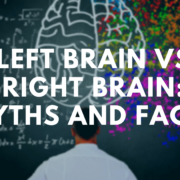Left Brain Vs. Right Brain: Myths and Facts

There’s some confusion about the functions of the two sides of the brain, so let’s talk about some myths and facts about brain hemisphericity.
We know that the the brain is organized into right and left hemispheres, but do these hemispheres have unique functions?
One of the most common beliefs is that personality traits are left or right brained. It’s typically thought that the left brain is for logic and problem solving, while the right brain is for creativity and spontaneity. Therefore people can train their left Brain by doing math, and train their right brain by doing art.
Verdict: 𝗙𝗮𝗹𝘀𝗲

A number of studies have found that logic and creativity tasks tend to light up both sides of the brain. Additionally, the brains of very creative or very logical people don’t tend to show much difference from one side to the other.
Now in #functionalneurology we do look for differences in right vs left Brain, but it’s not based on behavior or personality traits.
There are some brain functions that are organized by left and right brain predominance.
For example, we know that contracting a muscle on the left side uses mostly the right motor cortex. We know that perceiving touch on the right side is mostly perceived by the left sensory cortex. We also know that when strokes hit these parts of the brain, we can have a paresis or loss of sensation on the opposite side of the body.

What might be less known outside of a neurology office is that language and speech is a very left brain dominant function, while visuospatial awareness and attention is a very right brain biased function.
This was also born out of studies on stroke patients who develop bizarre presentations. Where specific strokes in the left brain can leave some patients with severe speech and language deficits, while some right sided strokes can leave a patient ignoring the whole left side of their body!

The stories on these cases documented in “Phantoms in the Brain” by Ramachandran are really incredible.
As always, #neurology and #neuroscience are endlessly fascinating!







